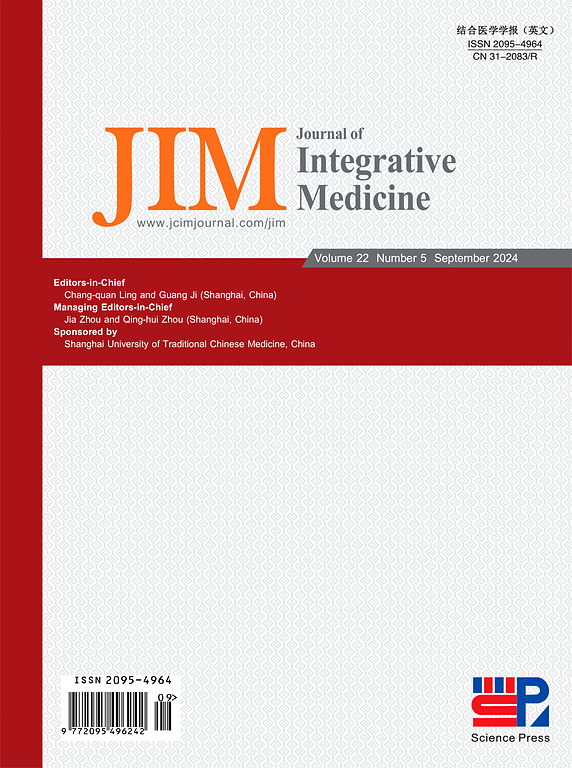CULTURAL ADAPTATION AND PSYCHOMETRIC VALIDATION OF THE SELF EFFICIENCY AND PERFORMANCE IN SELF-MANAGEMENT SUPPORT (SEPSS) QUESTIONNAIRE IN UNDERGRADUATE NURSING AND MEDICAL STUDENTS OF BANGLADESH
IF 4.2
2区 医学
Q1 INTEGRATIVE & COMPLEMENTARY MEDICINE
引用次数: 0
Abstract
In an aging society, healthcare professionals and students face increasing demands to actively involve patients in the decision-making process regarding their health conditions and lifestyles. Self-management support is considered a best practice that aligns with the patient-centered care paradigm in Bangladesh. However, there is currently no instrument available to assess healthcare professionals’ competencies in this field, particularly during their early education and training period. The aim of this study was to translate the Self Efficiency and Performance in Self-management Support (SEPSS) instrument into Bangla and validate its psychometric properties in a sample of undergraduate healthcare students in Bangladeshi higher education institutions. A cross-sectional study was conducted to assess the reliability, validity, and cultural appropriateness of the Bangla version of SEPSS-36 among 486 nursing and medical students. Confirmatory factor analysis was carried out using the chi-square model fit index (CMIN), comparative fit index (CFI), and Root Mean Square Error of Approximation (RMSEA) as fit indices. The internal consistency was estimated by the Cronbach alpha coefficient. The results indicate that the CMIN (2.658) and RMSEA (.058) values suggest that the sample data and hypothetical model are an acceptable fit in the analysis, with satisfactory CFI values (.895). The reliability for all SEPSS dimensions was acceptable. The Bangla version of the SEPSS questionnaire is a valid and reliable instrument that can assist healthcare educators and researchers in determining students’ competencies within this domain.孟加拉国本科护理和医学生自我管理支持(sepss)问卷中自我效能和表现的文化适应和心理测量验证
在老龄化社会中,医疗保健专业人员和学生面临着越来越多的需求,积极参与决策过程中的病人关于他们的健康状况和生活方式。自我管理支持被认为是与孟加拉国以患者为中心的护理模式相一致的最佳实践。然而,目前没有任何工具可用于评估保健专业人员在这一领域的能力,特别是在他们的早期教育和培训期间。本研究的目的是将自我管理支持的自我效率和绩效(SEPSS)工具翻译成孟加拉语,并在孟加拉国高等教育机构的本科医疗保健学生样本中验证其心理测量特性。本研究对486名护理和医学生进行了一项横断面研究,以评估孟加拉语版SEPSS-36的信度、效度和文化适宜性。采用卡方模型拟合指数(CMIN)、比较拟合指数(CFI)和近似均方根误差(RMSEA)作为拟合指标进行验证性因子分析。内部一致性用Cronbach α系数估计。结果表明,CMIN(2.658)和RMSEA(0.058)值表明样本数据和假设模型在分析中是可以接受的拟合,CFI值(0.895)令人满意。所有SEPSS尺寸的可靠性都是可接受的。孟加拉语版SEPSS问卷是一种有效和可靠的工具,可以帮助卫生保健教育工作者和研究人员确定学生在这一领域的能力。
本文章由计算机程序翻译,如有差异,请以英文原文为准。
求助全文
约1分钟内获得全文
求助全文
来源期刊

Journal of Integrative Medicine-Jim
Medicine-Complementary and Alternative Medicine
CiteScore
9.20
自引率
4.20%
发文量
3319
期刊介绍:
The predecessor of JIM is the Journal of Chinese Integrative Medicine (Zhong Xi Yi Jie He Xue Bao). With this new, English-language publication, we are committed to make JIM an international platform for publishing high-quality papers on complementary and alternative medicine (CAM) and an open forum in which the different professions and international scholarly communities can exchange views, share research and their clinical experience, discuss CAM education, and confer about issues and problems in our various disciplines and in CAM as a whole in order to promote integrative medicine.
JIM is indexed/abstracted in: MEDLINE/PubMed, ScienceDirect, Emerging Sources Citation Index (ESCI), Scopus, Embase, Chemical Abstracts (CA), CAB Abstracts, EBSCO, WPRIM, JST China, Chinese Science Citation Database (CSCD), and China National Knowledge Infrastructure (CNKI).
JIM Editorial Office uses ThomsonReuters ScholarOne Manuscripts as submitting and review system (submission link: http://mc03.manuscriptcentral.com/jcim-en).
JIM is published bimonthly. Manuscripts submitted to JIM should be written in English. Article types include but are not limited to randomized controlled and pragmatic trials, translational and patient-centered effectiveness outcome studies, case series and reports, clinical trial protocols, preclinical and basic science studies, systematic reviews and meta-analyses, papers on methodology and CAM history or education, conference proceedings, editorials, commentaries, short communications, book reviews, and letters to the editor.
Our purpose is to publish a prestigious international journal for studies in integrative medicine. To achieve this aim, we seek to publish high-quality papers on any aspects of integrative medicine, such as acupuncture and traditional Chinese medicine, Ayurveda medicine, herbal medicine, homeopathy, nutrition, chiropractic, mind-body medicine, taichi, qigong, meditation, and any other modalities of CAM; our commitment to international scope ensures that research and progress from all regions of the world are widely covered. These ensure that articles published in JIM have the maximum exposure to the international scholarly community.
JIM can help its authors let their papers reach the widest possible range of readers, and let all those who share an interest in their research field be concerned with their study.
 求助内容:
求助内容: 应助结果提醒方式:
应助结果提醒方式:


